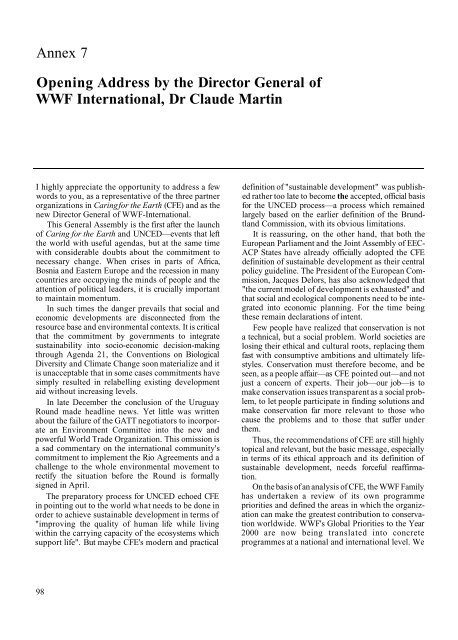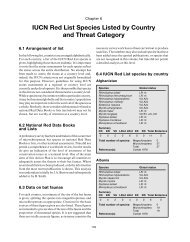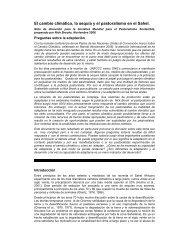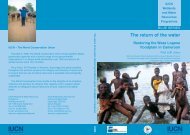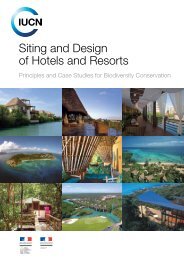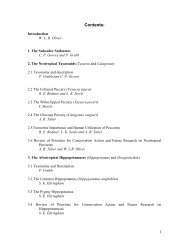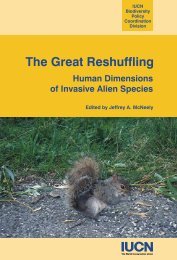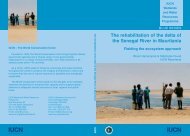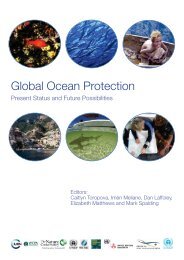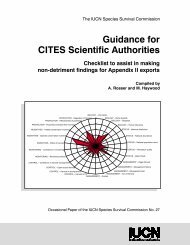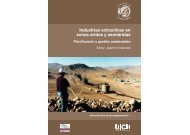Buenos Aires, Argentina - IUCN
Buenos Aires, Argentina - IUCN
Buenos Aires, Argentina - IUCN
Create successful ePaper yourself
Turn your PDF publications into a flip-book with our unique Google optimized e-Paper software.
Annex 7<br />
Opening Address by the Director General of<br />
WWF International, Dr Claude Martin<br />
I highly appreciate the opportunity to address a few<br />
words to you, as a representative of the three partner<br />
organizations in Caring for the Earth (CFE) and as the<br />
new Director General of WWF-International.<br />
This General Assembly is the first after the launch<br />
of Caring for the Earth and UNCED—events that left<br />
the world with useful agendas, but at the same time<br />
with considerable doubts about the commitment to<br />
necessary change. When crises in parts of Africa,<br />
Bosnia and Eastern Europe and the recession in many<br />
countries are occupying the minds of people and the<br />
attention of political leaders, it is crucially important<br />
to maintain momentum.<br />
In such times the danger prevails that social and<br />
economic developments are disconnected from the<br />
resource base and environmental contexts. It is critical<br />
that the commitment by governments to integrate<br />
sustainability into socio-economic decision-making<br />
through Agenda 21, the Conventions on Biological<br />
Diversity and Climate Change soon materialize and it<br />
is unacceptable that in some cases commitments have<br />
simply resulted in relabelling existing development<br />
aid without increasing levels.<br />
In late December the conclusion of the Uruguay<br />
Round made headline news. Yet little was written<br />
about the failure of the GATT negotiators to incorporate<br />
an Environment Committee into the new and<br />
powerful World Trade Organization. This omission is<br />
a sad commentary on the international community's<br />
commitment to implement the Rio Agreements and a<br />
challenge to the whole environmental movement to<br />
rectify the situation before the Round is formally<br />
signed in April.<br />
The preparatory process for UNCED echoed CFE<br />
in pointing out to the world what needs to be done in<br />
order to achieve sustainable development in terms of<br />
"improving the quality of human life while living<br />
within the carrying capacity of the ecosystems which<br />
support life". But maybe CFE's modern and practical<br />
98<br />
definition of "sustainable development" was published<br />
rather too late to become the accepted, official basis<br />
for the UNCED process—a process which remained<br />
largely based on the earlier definition of the Brundtland<br />
Commission, with its obvious limitations.<br />
It is reassuring, on the other hand, that both the<br />
European Parliament and the Joint Assembly of EEC-<br />
ACP States have already officially adopted the CFE<br />
definition of sustainable development as their central<br />
policy guideline. The President of the European Commission,<br />
Jacques Delors, has also acknowledged that<br />
"the current model of development is exhausted" and<br />
that social and ecological components need to be integrated<br />
into economic planning. For the time being<br />
these remain declarations of intent.<br />
Few people have realized that conservation is not<br />
a technical, but a social problem. World societies are<br />
losing their ethical and cultural roots, replacing them<br />
fast with consumptive ambitions and ultimately lifestyles.<br />
Conservation must therefore become, and be<br />
seen, as a people affair—as CFE pointed out—and not<br />
just a concern of experts. Their job—our job—is to<br />
make conservation issues transparent as a social problem,<br />
to let people participate in finding solutions and<br />
make conservation far more relevant to those who<br />
cause the problems and to those that suffer under<br />
them.<br />
Thus, the recommendations of CFE are still highly<br />
topical and relevant, but the basic message, especially<br />
in terms of its ethical approach and its definition of<br />
sustainable development, needs forceful reaffirmation.<br />
On the basis of an analysis of CFE, the WWF Family<br />
has undertaken a review of its own programme<br />
priorities and defined the areas in which the organization<br />
can make the greatest contribution to conservation<br />
worldwide. WWF's Global Priorities to the Year<br />
2000 are now being translated into concrete<br />
programmes at a national and international level. We


